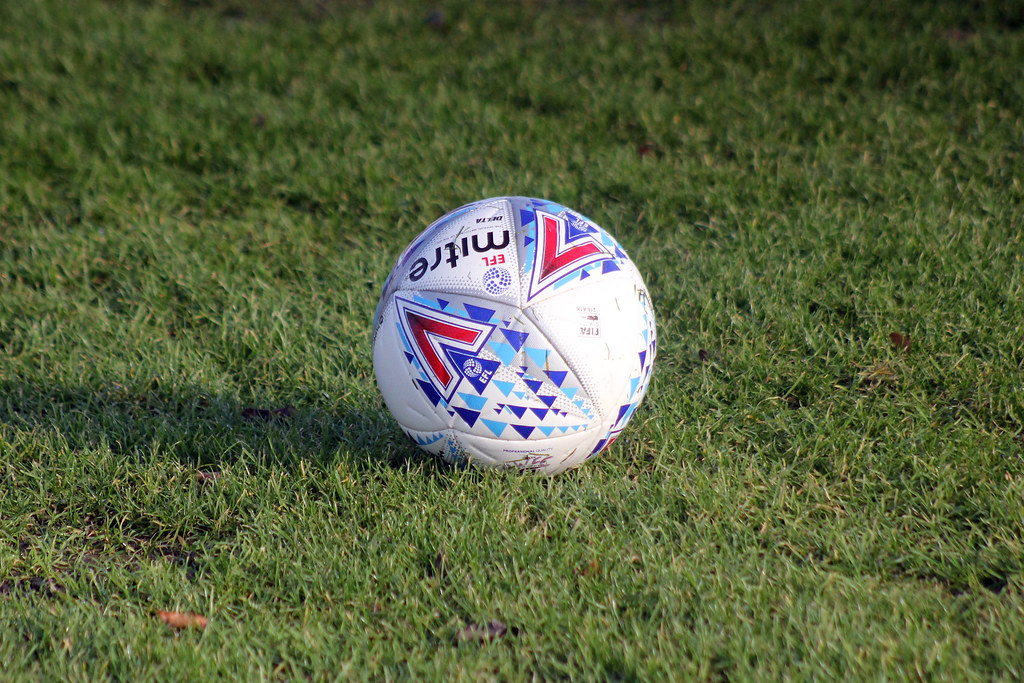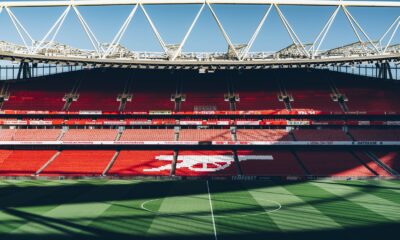Football
League One Football: End of Term Report

League One Football: End of Term Report
With schools officially dismissed for the summer, we’re looking at the EFL and giving them their end-of-term report and grades. It’s League One this time and it’s fair to say there have been performances at both ends of the spectrum this year…
CONFIRMED: PPG League One table standings. #LeagueOne #EFL_HUB pic.twitter.com/dEEDdjMz54
— EFL HUB ⚜️ (@efl_hub) June 9, 2020
Accrington Stanley: C
Following a season in which Stanley let a play-off place slip to finish in mid-table, the decline shown towards the end of that campaign continued into the 2019-20 season. Flirting with the relegation places in November, a string of four defeats in 14 made sure they wouldn’t be sucked into trouble. Three defeats in the last four for John Coleman’s men meant that they would only finish eight points above the drop zone in 17th. Reaching the quarter-finals of the EFL Trophy does paper over some of the cracks, so all in all, it’s been an OK season.
AFC Wimbledon: C-
21 points from the last 12 matches secured safety for incoming manager Wally Downes’ men last summer, having spent almost a third of the campaign rooted to the bottom of the table. In somewhat of a sense of Deja vu, the Wombles changed manager in October of last year; Glyn Hodges taking over a side which took 12 matches to get it’s first win, laying 21st when he arrived through the office door. A mixed bag of results followed, but one defeat in six prior to the season’s end ensured they finished three points clear of danger. Another year of consolidation, but sideways movement can’t last forever.
Blackpool: C
Inconsistency in the middle and latter half of the 2018-19 season saw them fall away from the play-off places. Simon Grayson returned to the club at the start of this season, increasing their chances of getting involved in the promotion race. Having initially held an automatic position, they maintained a play-off place until mid-December but a string of defeats would cost Grayson his job and replacement Neil Critchley could only guide the Bloomfield Road outfit into 13th place with an almost identical wins-draws-losses record. ‘Pool will miss two-time top scorer Armand Gnanduillet now he’s been released and will need to replace him if they’re to revive their fortunes.
Bolton Wanderers: F
In the midst of hugely turbulent times for one of England’s oldest clubs, Keith Hill was unable to guide his side out of the relegation places, resulting in back-to-back demotions. A winding-up order, unpaid tax bills, unpaid players and beginning the season with only three contracted players had the writing on the wall for Wanderers, not to mention starting the season with a 12-point deduction. On the pitch, they conceded 4+ goals on seven occasions and were forced to field youth players far more often than they would have intended. In the circumstances, it was remarkable to see young players digging in to earn more points than Southend United this campaign and you can’t help but wish them well as they look to bounce back next season.
? Bolton Wanderers' summer business so far…
Ian Evatt ✍️
Eoin Doyle ✅
Antoni Sarcevic ✅
George Taft ✅#BWFC pic.twitter.com/9JqCBi3X2y— Football League Zone (@TheFLZone) July 20, 2020
Bristol Rovers: B-
There’ll be a feeling of “what might have been” around the Memorial Stadium this summer. Graham Coughlin led his side into a play-off position at Christmas but left to take the reigns at Mansfield Town. Ben Garner was unable to match such heights and ultimately, two wins in 16 matches is far from the form required to maintain such a push, particularly with the strength of other teams in the division. Having said that, they finished a place higher than last season and progress is progress, no matter how small.
Burton Albion: C
It doesn’t get any more mid-table for Nigel Clough’s Brewers. 12 wins, 12 draws and 11 losses, a goal difference of 0 and finishing 12th out of 23, three points clear of 13th and four off 11th. A real mixed bag of results had the Derbyshire outfit around the middle of the table for the majority of the campaign; they seldom put a run of any sort together besides that of five wins in six over the festive period, which briefly had them up in 6th place. But too many draws and only one win after that resulted in that “average” feeling around the club. Clough stepped down to protect the club from financial woe amid the Coronavirus pandemic.
Coventry City: A
What a story. Owners at loggerheads with the Ricoh Arena, the Sky Blues were forced to play their home games at Birmingham City’s St. Andrews stadium for the season while they source new premises. Mark Robins, who had already masterminded a play-off final victory and an EFL Trophy victory during his second stint at the club, led his men to the League One title, doing so having lost only three matches. Their final run of 14 matches unbeaten was perfectly timed, seeing them into the top two just five games before the season came to an abrupt end. It will be good to see them back in the second tier and under Robins, why not make it back-to-back?
NEWS: Coventry City and the University of Warwick announce new Sky Blues stadium plans.
➡️ https://t.co/qIav2Q2e1b #PUSB pic.twitter.com/aXpi4XWUZd
— Coventry City (@Coventry_City) July 21, 2020
Doncaster Rovers: C
Following his controversial sacking by West Brom in March last year, Darren Moore took over at Doncaster Rovers and with the wealth of experience at his disposal, was expected to be in or around the top six. Characteristically, his side became difficult to beat – only Champions Coventry City and Sunderland conceded fewer goals this term – but never put a long enough run together to trouble the promotion places. Five without a win across November and December was a contributing factor to finishing six points off the play-offs. With Wigan, Charlton and Hull joining them next season, in addition to the other main suspects for promotion, Rovers’ struggle could be even bigger.
Fleetwood Town: B
Home form laid the foundation for a play-off run for Joey Barton’s side this season. Just a single defeat at Highbury Stadium, in addition to solid away form meant that they were able to make the top six, despite looking like they’d bottled it around January. Only Coventry City lost fewer matches than Fleetwood and going into the play-offs unbeaten in 13 matches arguably gave them an edge on their rivals. But they walked into rampant Wycombe side who put six past them in the semi-finals, leaving the Lancashire side to fight it out again next season.
Gillingham: C+
Difficult to beat, but lacking the quality to win enough matches to climb the table. It’s a paradox that divides fans and Gillingham have presented it upon their supporters this season. Only beaten on eight occasions, the Gills drew too many games to get close to the play-offs. Losing more home games than away, 12 draws on the road ensured they dropped enough points to remain a way off the top six. Even a 15-match unbeaten run only saw them rise five places to 10th, where they would eventually finish. They’ll need to add to the squad if they’re going to make a serious run next term.
Ipswich Town: F
Having come down from the Championship and signed the EFL’s leading scorer from last season, the Tractor Boys were cast-iron favourites to go straight back up, most likely as champions. After a promising start – 11 matches unbeaten – things began to unravel for Paul Lambert’s side. No win in eight matches either side of the Christmas period and seven defeats in the last nine matches saw the Suffolk outfit slip to 10th position, which became 11th after the points-per-game ending. Only just in the top half with a team that initially made it clear they could get out of League One – not a season that Town fans will seek to remember.
The League 1 line up for next season…
Probably an even tougher league than last! ? #itfc pic.twitter.com/4OsTDfhKW5
— IPSWICH TOWN FANS (@IpswichTownFans) July 23, 2020
Lincoln City: C+
Head and shoulders above the rest of League Two last season, Lincoln City’s success was the reason the Cowley brothers were headhunted by Huddersfield Town and the philosophy of the club was set to change. An attacking mindset was switched out for one of possession-based football instilled by Michael Appleton. This, unfortunately, took the Imps from the play-off places to the forgotten wasteland of mid-table. With the fewest draws in the division, Appleton’s tactics had somewhat of an all-or-nothing outcome. But if you offered Lincoln fans 16th place, ten points clear of danger at the start of the season, they’d have bitten your hand off.
MK Dons: B-
Taking the final automatic promotion place in League Two following relegation the season before, MK Dons were looking for further progression to avoid becoming a “yoyo club.” Unfortunately, they found themselves somewhat out of their depth initially, amassing just 13 points in their first 18 matches, during which time manager Paul Tisdale was shown the exit. New manager Russell Martin certainly turned the tide before the season was halted, earning victories against Oxford United, Portsmouth and Wycombe Wanderers. Safety assured, Dons fans can be pleased overall with the season’s work.
Oxford United: B+
Only Peterborough United, largely thanks to standout top scorer Ivan Toney, outscored Karl Robinson’s men in League One this season. The former MK Dons boss has instilled an attacking brand of football at the Kassam Stadium since his arrival a couple of years back; this really took off in the Autumn with just one defeat in 15 matches. But it was five wins on the spin prior to lockdown that put the Yellows into the play-offs but having seen off Portsmouth on penalties, found Wycombe Wanderers a bit too big a step to take. Constantly improving over time, look out for them again next season.
Peterborough United: C+
Following bitter disappointment in missing out on the play-off places last summer Peterborough United were not going to sit on their laurels. Christy Pym, almost the entirety of the defensive squad (mostly on free transfers), a quartet of midfielders and Mo Eisa were all drafted into the squad with the intention of joining the likes of Ipswich, Sunderland et al for the big prize of automatic promotion. But a run of no wins in six over the festive period slid them down to 10th which ultimately cost them, missing out again by 0.02 points per game. Will likely be amongst the running again next time out, but this season has to go down as “must do better.”
Portsmouth: D
It remains one of football’s biggest unanswered questions as to how a club as large as Portsmouth continues to languish in the third tier. Following their severe financial turmoil, this season was their third in League One after an 8th-place finish and an unsuccessful play-off run last season. Unfortunately for the loyal Fratton Park faithful, it would be Deja vu as their rotten play-off record would continue. Having taken the lead in both legs of the semi-final, they were unable to hold on to either of them and missed out on Wembley after a 5-4 penalty shoot-out defeat. While they remain in this league, they’ll always be amongst the favourites. But for 2019-20, it’s no better than last year, which was barely passable.
Rochdale: D
Another season of relative mediocrity for the Spotland club. An all-or-nothing set of results (only six draws all season) went largely against them and their 18th position in the table could have been a lot worse were it not for the 15 goals of Ian Henderson. The striker was only outscored by Ivan Toney this season but with insufficient backup to him and the leakiest defence outside the relegation places, Rochdale are in danger of going backwards before going forwards.
Rotherham: A
Unlike their fellow relegated clubs, Rotherham United were able to achieve promotion at the first time of asking. Having spent much of the first half of the curtailed season floating around mid-table, Paul Warne’s Millers turned their form around from November onwards, getting to the summit of the table just after New Year. They would hold this position for the majority of the campaign courtesy of nine wins in 11 matches but would eventually be caught by Coventry City. Not that anyone associated with the Yorkshire side will care a jot – they’re back in the Championship!
✍️ | Mickel is a Miller!
Read more about our first signing ahead of the 2020/21 campaign here. ⬇️#rufc | #ForeverTogetherForeverProud https://t.co/akF9tKqgZW pic.twitter.com/4XhMohM7eP
— Rotherham United (@OfficialRUFC) July 5, 2020
Shrewsbury Town: C+
Since reaching the play-offs two seasons ago, Shrewsbury Town have missed the coaching of Paul Hurst, who had the ability to galvanise a squad of players to heights not seen before at New Meadow. With more players heading out than coming in, it was always likely to affect the balance of the squad, even with the experience of Ethan Ebanks-Landell and Steve Morison being amongst them. This manifested in the form of a lack of goals; the second lowest tally in the division saw the three top scorers score just four goals apiece. More consolidation and a three-place improvement for Shrewsbury will have the fans content but they’ll want more advancement next term.
Southend United: F
Two wins in the last three matches only saved Southend from relegation on goal difference last term, but Kevin Bond and latterly, Sol Campbell could not prevent the scenario occurring this time around. Amid huge financial problems, including a winding-up petition heard in January, the Shrimpers managed just four wins all season. Coupled with the leakiest defence by 19 goals, this saw them finish 22nd in the table, only off the bottom on account of Bolton’s 12-point deduction for entering administration. Being so distant from the rest of the league, both on and off the pitch, is likely to see them struggle next term as well. Tough times ahead.
HM Revenue and Customs winding-up petition against Southend United Football Club, over unspecified amount of tax that's owed, has been adjourned until September 16th https://t.co/cOue1bd5up pic.twitter.com/w4JpxNBiFz
— BBC Essex Sport (@BBCEssexSport) July 22, 2020
Sunderland: F
Beaten in last season’s play-off final, Sunderland were again widely tipped to make a serious run at the top league positions this time around. A point short of the play-offs having played a game more, the points-per-game method of ending the campaign did the Black Cats no favours. But then neither did their run of three wins in 12 matches in the Autumn. Undoubtedly a bigger club than the league they’re in, the inability to get out of the third tier is unquestionably a failure.
Tranmere Rovers: C-
After back-to-back, Tranmere Rovers were one of many people’s favourites for relegation, particularly after losing James Norwood – the EFL’s leading scorer last season. Three consecutive wins in their final three outings weren’t enough to escape relegation given the aforementioned points-per-game ending. They finished the season as third-lowest scorers, with third-highest amount of goals conceded. Hugely disappointing given the form they began to show, but stats suggest that their third-bottom finished seems most justified.
Wycombe Wanderers: A*
14 defeats in the second half of last season saw Gareth Ainsworth’s side slip from mid-table to finishing just three points above relegation, a fate widely considered to be Wycombe’s for this summer. But having occupied the automatic promotion places for more than half of the season, the Chairboys dropped into the play-offs by just 0.03 points per game. Having overcome Fleetwood Town 6-3 in the semi-finals, Ainsworth’s men overcame Oxford United in the final to gain promotion to the second tier for the first time in the club’s history. Easy relegation candidates to promotion material…possibly the greatest success story in English football this season.
CONFIRMED: Championship defenders will be preparing to face Adebayo Akinfenwa next season.
He's signed a new deal at Wycombe. #Chairboys pic.twitter.com/XWWvgYUfUt
— bet365 (@bet365) July 16, 2020
We hope you enjoyed this article ‘League One Football: End of Term Report’. Who do you think will be promoted and relegated from League One next season? Let us know!
Read more on football here:
-

 News2 weeks ago
News2 weeks agoThe Best Male Tennis Players of All Time
-

 Uncategorised2 weeks ago
Uncategorised2 weeks agoWhat Dinosaur Has 500 Teeth?
-

 Football2 weeks ago
Football2 weeks agoThe Best Penalty Takers of All Time
-

 News2 weeks ago
News2 weeks agoThe Fastest Rugby Players Ever
-

 Football2 weeks ago
Football2 weeks ago10 of the most underrated footballers in the world right now
-

 Football2 weeks ago
Football2 weeks agoPlayers with the most goals in a Premier League season
-

 Football2 weeks ago
Football2 weeks agoWho is the Fastest Football Player in the World?
-

 Football2 weeks ago
Football2 weeks agoChelsea’s Possible Lineup For Next Season




















